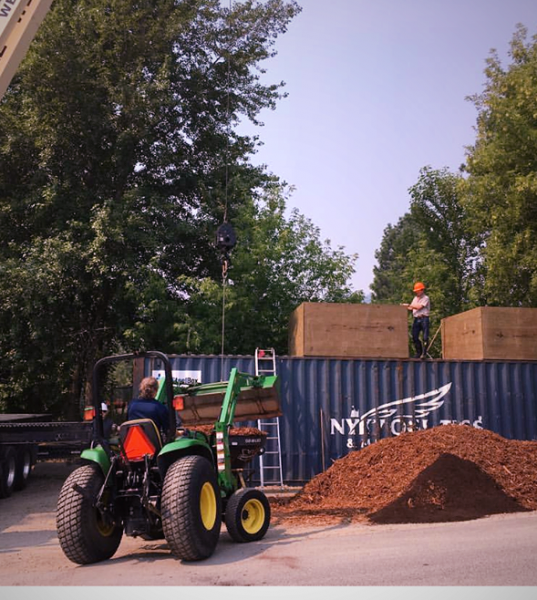Established in 2014, the TRU Campus Strategic Sustainability Plan (CSSP) is closely tied to one of TRU’s Strategic Priorities that seeks to increase sustainability practices. The TRU Sustainability Office plays an active role in four main areas: operations, engagement, academic and administration/governance, which connects with economic, environmental and socio-cultural standards.
Centered on energy efficiency, campus and community education, as well as through projects, promotions and initiatives, TRU strives to waste nothing and make the most of everything. In fact, any dollars saved through sustainability is reinvested into future department initiatives.
During the summer, co-op student Aaron Wiebe facilitated and coordinated the installation of biofilters that he developed for the on-campus composters. The project was so massive that a large crane was utilized to install the filters.
Measuring the biofilters’ success is difficult. “No one knows it’s there—which is a good thing. It’s designed to be invisible—you just set it and forget it. The absence of smell, the lack of concerns and complaints from compost neighbours is the reward,” Aaron remarked.
The Natural Resource Science major noted that visibility is key to heightening environmental awareness. “Education is necessary for individuals to receive relatable solutions and reasons to engage. For example, one of the barriers to sustainability is cost. We need to work through perceived inconveniences to understand the long-term benefits.”
For those curious about how to best support sustainable practices, Aaron says that it narrows down to energy, transportation, water usage and food consumption. “It’s about reflecting on our ecological footprint and changing habits that create a real-world impact.”
In addition, Aaron is also a Zipcar representative, which has been hugely popular amongst staff and students alike. He supports a number of projects around the office, including the Sustainability Tracking, Assessment & Rating System (STARS) report, which he describes as an “staggeringly large environmental rating and tracking system.”
TRU Director of Environment and Sustainability Jim Gudjonson said, “STARS is the benchmarking tool and measuring device for over 600 universities and colleges. It’s the framework of our sustainability plan.”
Based on the STARS report, the Association for the Advancement of Sustainability in Higher Education (AASHE) recently named TRU as sixth in the Overall Top Performers list—(the only Canadian institution on the list) as offering the best sustainable practices on campus.
Jim reflected, “Aaron has held us together and keeps things on track. He’s passionate about sustainability and the diversity of projects. A whiz at Excel and Powerpoint—he can make anything work.”
Co-op Coordinator Marion Oke remarked, “Aaron has worked on some very cool projects. He is very enthusiastic about the great initiatives coming out of the Sustainability Office.”
A year away from graduation, Aaron, a father of one, is considering a Master’s and a future career in sustainability. He credits not only the support from Jim and Marion, but also the access to the experiences that helped develop his professional growth.
Aaron remarked that the daily tasks involve a great deal of “research and reports, which is well within my comfort zone. I enjoy those processes. There has been so much learning along the way.”
Check out the website for more information about Career Education.
Check out the website for more information about Sustainability.

During the summer, co-op student Aaron Wiebe facilitated and coordinated the installation of biofilters that he developed for the on-campus composters. The project was so massive that a large crane was utilized to install the filters.

